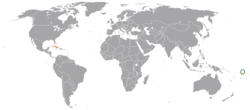
Cuba's foreign policy has been fluid throughout history depending on world events and other variables, including relations with the United States. Without massive Soviet subsidies and its primary trading partner, Cuba became increasingly isolated in the late 1980s and early 1990s after the fall of the USSR and the end of the Cold War, but Cuba opened up more with the rest of the world again starting in the late 1990s when they have since entered bilateral co-operation with several South American countries, most notably Venezuela and Bolivia beginning in the late 1990s, especially after the Venezuela election of Hugo Chávez in 1999, who became a staunch ally of Castro's Cuba. The United States used to stick to a policy of isolating Cuba until December 2014, when Barack Obama announced a new policy of diplomatic and economic engagement. The European Union accuses Cuba of "continuing flagrant violation of human rights and fundamental freedoms". Cuba has developed a growing relationship with the People's Republic of China and Russia. Cuba provided civilian assistance workers – principally medical – to more than 20 countries. More than one million exiles have escaped to foreign countries. Cuba's present foreign minister is Bruno Rodríguez Parrilla.

The government of the Federated States of Micronesia (FSM) conducts its own foreign relations. Since independence in 1986, the FSM has established diplomatic relations with 92 countries, including all of its Pacific neighbors.

Nauru, following independence from the United Kingdom, became a sovereign, independent republic on 31 January 1968. Nauru has established diplomatic relations with a number of nations, including most of its Pacific neighbors with which it maintains economic, cultural and administrative ties.
From 1916 to 1975, Tuvalu was part of the Gilbert and Ellice Islands colony of the United Kingdom. A referendum was held in 1974 to determine whether the Gilbert Islands and Ellice Islands should each have their own administration. As a consequence of the referendum, the separate British colonies of Kiribati and Tuvalu were formed. Tuvalu became fully independent as a sovereign state within the Commonwealth on 1 October 1978. On 5 September 2000, Tuvalu became the 189th member of the United Nations.
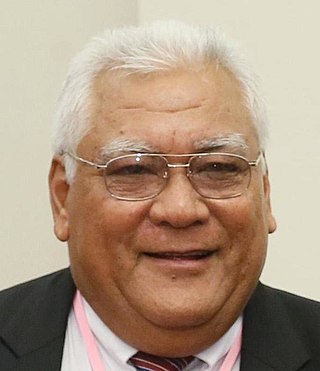
Maatia Toafa OBE is a Tuvaluan politician, representing Nanumea, who served two non-consecutive terms as Prime Minister of Tuvalu. He first served as prime minister, and foreign minister, from 2004 to 2006, from the resignation of his predecessor, Saufatu Sopoanga, until the defeat of his Cabinet in the 2006 general election. From 2004 to 2006 he also held the role of foreign minister.

Apisai Ielemia was a Tuvaluan politician. He served as the tenth Prime Minister of Tuvalu from 2006 to 2010, and also held the role as Foreign Minister. He was returned as a member of parliament in the 2010 Tuvaluan general election. He was re-elected to parliament in the 2015 Tuvaluan general election. On 5 October 2016 Chief Justice Sweeney of the High Court of Tuvalu declared that Ielemia’s parliamentary seat was vacant as he was not qualified to be a member of parliament, as the consequence of the short time the opposition MP served time in jail following his conviction on 6 May 2016 in the Magistrate’s Court of charges of abuse of office during the final year of his term as prime minister. The abuse of office charges related to payments deposited into a National Bank of Tuvalu personal account. The 5 October 2016 decision of the Chief Justice was controversial as it appeared to contradict the June 2016 decision of Justice Norman Franzi of the High Court of Tuvalu that had quashed Ielemia’s conviction and acquitted him of the abuse of office charges. The appeal to the High Court held that the conviction was "manifestly unsafe," with the court quashing the 12-month jail term.
General elections were held in Tuvalu on 3 August 2006 to elect fifteen members to the Parliament. There were 5,765 eligible voters on the electoral roll. 32 candidates, including 2 women, competed for the 15 seats. All fifteen candidates elected were Independents, as there are no political parties in the country.

Willy Telavi is a Tuvaluan politician who was Prime Minister of Tuvalu from 2010 to 2013.
Lotoala Metia was a Tuvaluan politician and football player.
Taukelina Finikaso is a political figure from the Pacific nation of Tuvalu. At the 2006 general election, he was elected MP for his home constituency of Vaitupu. He was educated in Kiribati and Fiji before acquiring a Law Degree at the University of Tasmania and a master's degree in International Law from Sydney University. Finikaso was admitted on 16 October 1987 to the Supreme Court of the Australian Capital Territory. Prior to entering into politics, Finikaso worked as a lawyer and then as a Permanent Secretary under the different ministries of the Government. Finikaso has been a Member of Parliament for the Constituency of Vaitupu from 2006 to 2019. He was not re-elected in the 2019 general election.
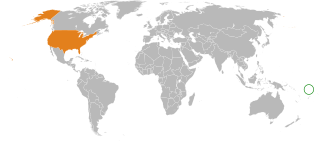
Tuvalu – United States relations are bilateral relations between Tuvalu and the United States.
Cuban-Pacific relations are diplomatic, economic, cultural, and other relations between the Cuba and countries situated in Oceania. In the 2000s, Cuba has been strengthening its relations with Pacific nations, which have, for the most part, responded favorably to Cuban medical aid in particular. The first Cuba-Pacific Islands ministerial meeting was held in September 2008 in Havana, with government members from ten Pacific countries—Kiribati, Tuvalu, Nauru, Solomon Islands, Fiji, Tonga, Vanuatu, Samoa, the Federated States of Micronesia and Papua New Guinea—attending. The meeting was a consolidation rather than a starting point of Cuban-Pacific relations.

Relations between Solomon Islands and the Republic of Cuba have only a short history. The two countries moved to establish relations from the 2000s, and particularly from 2007, within the context of Cuba's growing interest in the Pacific Islands region. Like other countries in Oceania, Solomon Islands is a beneficiary of Cuban medical aid; bilateral relations between Havana and Honiara must be viewed within the scope of Cuba's regional policy in Oceania.
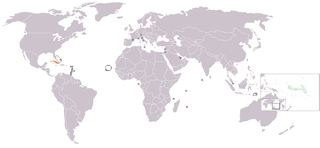
Diplomatic relations between Kiribati and Cuba developed in the 2000s (decade). Like other countries in Oceania, Kiribati is a beneficiary of Cuban medical aid; bilateral relations between Tarawa and Havana must be viewed within the scope of Cuba's regional policy in Oceania.

Relations between Vanuatu and Cuba began shortly after the former gained its independence from France and the United Kingdom in 1980, and began establishing its own foreign policy as a newly independent state. Vanuatu and Cuba established official diplomatic relations in 1983.
Tuvalu became the 189th member of the United Nations in September 2000. Tuvalu is one of 14 states not recognising the People's Republic of China. The country has played a role in advocating for more ambitious international cooperation on mitigating climate change, given the country's vulnerability to its impacts.
After the 1959 Cuban Revolution, Cuba established a program to send its medical personnel overseas, particularly to Latin America, Africa, and Oceania, and to bring medical students and patients to Cuba for training and treatment respectively. In 2007, Cuba had 42,000 workers in international collaborations in 103 countries, of whom more than 30,000 were health personnel, including at least 19,000 physicians. Cuba provides more medical personnel to the developing world than all the G8 countries combined. The Cuban missions have had substantial positive local impacts on the populations served. It is widely believed that medical workers are a vital export commodity for Cuba. According to Granma, the Cuban state newspaper, the number of Cuban medical staff abroad fell from 50,000 in 2015 to 28,000 in 2020.
Dr. Falesa Pitoi is a Tuvaluan politician.
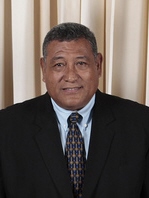
The Ielemia Ministry was the 11th ministry of the Government of Tuvalu, led by Prime Minister Apisai Ielemia. It succeeded the First Toafa Ministry following the 2006 election, but was voted out of office after the 2010 election and was succeeded by the Second Toafa Ministry, led by Maatia Toafa.

Simon Kofe is a Tuvaluan politician. He was appointed as the Minister for Justice, Communication & Foreign Affairs, in the cabinet of Kausea Natano following the 2019 Tuvaluan general election.
